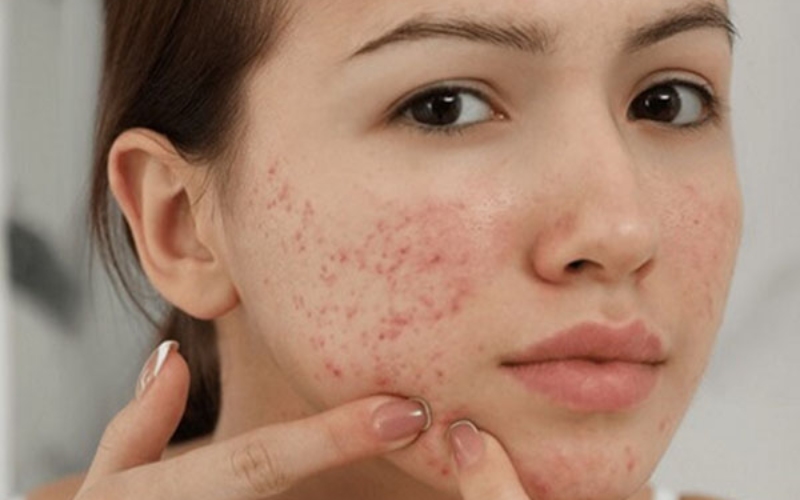While the wavelength of blue light is not as aggressive as the ultraviolet rays from the sun, its prolonged exposure, especially from continuous computer use, can be equally damaging to the skin. So, save this article to take care of your skin when working long hours on the computer!
1 The Harmful Effects of Blue Light on the Skin
Premature Skin Aging
Blue light is a contributing factor in accelerating skin aging, causing sagging, loss of elasticity, and wrinkles. This is because blue light breaks down two important components in the skin: collagen and elastin.
Collagen acts like a “scaffolding” that keeps the skin firm and smooth, while elastin provides elasticity and strength.
Additionally, blue light stimulates the production of melanin, leading to dull skin and the appearance of dark spots and freckles.
 Premature Skin Aging
Premature Skin Aging
Dry Skin
Working long hours in front of a computer exposes us to significant amounts of blue light, which can cause a range of skin issues, including dry, flaky, and cracked skin, as well as fatigue and dullness.
 Dry Skin
Dry Skin
Acne
The electric charge from computer screens can affect the skin in multiple ways, one of which is by increasing the risk of acne.
The positive electric charge from the screen attracts fine dust particles in the air, making them more likely to adhere to the skin. When combined with sebum and dead skin cells, these fine dust particles can clog pores, creating an environment conducive to bacterial growth and acne formation.
The electric charge can also weaken the skin’s protective barrier, making it more susceptible to external aggressors such as bacteria and UV rays.
 Acne
Acne
Disruption of Sleep
Using a computer late at night carries various health risks, particularly due to the impact of blue light. Blue light has the ability to suppress the production of melatonin, a hormone that plays a crucial role in regulating sleep-wake cycles and inducing sleepiness. When melatonin levels are disrupted, the body enters a state of alertness, leading to difficulty falling asleep and poor sleep quality. Low melatonin levels also contribute to accelerated skin aging, collagen breakdown, and the appearance of wrinkles.
 Disruption of Sleep
Disruption of Sleep
2 Tips for Skin Care When Using a Computer Frequently
Use Sunscreen
Did you know that blue light from phone and computer screens can also be harmful to the skin? Therefore, applying sunscreen is an essential step in skincare, regardless of whether you go outdoors or not.
Opt for a broad-spectrum sunscreen with an SPF of 30 or higher, and look for moisturizing ingredients to optimize skin protection.
Ingredients commonly found in sunscreens, such as titanium dioxide, zinc oxide, avobenzone, and ecamsule, are effective in blocking UV rays… However, to protect against blue light, sunscreens should also contain iron oxide.
 Use Sunscreen
Use Sunscreen
Use Antioxidant and Brightening Products
Products containing vitamins C, E, and B3, as well as hyaluronic acid, are excellent choices for antioxidant protection. Notably, vitamin C, when combined with sunscreen during the day, creates a powerful “shield” to safeguard your skin while you work on your computer.
 Use Antioxidant and Brightening Products
Use Antioxidant and Brightening Products
Maintain a Healthy Distance When Working
To protect your health and eyesight, it’s important to maintain a safe distance from your computer screen. Specifically:
-
Distance from the face to the screen: Optimally, maintain a distance of 60 to 70 cm. This distance reduces eye strain, minimizing the risk of eye dryness and other vision problems.
-
Distance from the keyboard to the face: Keep a distance of about 30 to 40 cm. This helps you maintain a comfortable posture, reducing pressure on your wrists and neck, thus preventing musculoskeletal issues.
 Maintain a Healthy Distance When Working
Maintain a Healthy Distance When Working
Facial Cleansing
Blue light from computer screens creates a favorable environment for fine dust and bacteria to penetrate the skin, making it more prone to damage and acne. Therefore, thorough facial cleansing after computer use is of utmost importance in your skincare routine.
Additionally, it’s crucial to refrain from touching your face while working on the computer. Keyboard surfaces are breeding grounds for bacteria, and touching your face increases the likelihood of bacterial transfer, leading to skin problems.
 Facial Cleansing
Facial Cleansing
Nighttime Skin Care
Incorporate the following steps into your nighttime skincare routine:
-
Remove makeup and impurities with a gentle cleanser.
-
Follow up with a hydrating toner to ensure your skin is thoroughly cleansed.
-
Use a chemical exfoliator containing AHAs or BHAs.
-
This helps remove dead skin cells and promotes skin renewal.
-
Apply a calming and restorative toner to balance the skin’s pH and prepare it for better absorption of subsequent products.
-
Use a targeted serum to address your specific skin concerns (e.g., vitamin C serum, hyaluronic acid serum, etc.).
-
These serums provide essential nutrients, combat aging, and maintain youthful-looking skin.
Step 5 Moisturize
-
Seal in moisture with a moisturizer suited to your skin type.
-
This helps maintain soft, supple, and well-hydrated skin.
Consistency is key—incorporate these nighttime skincare steps into your daily routine to achieve healthy, glowing skin.
 Nighttime Skin Care
Nighttime Skin Care
These are some skincare tips for individuals who spend a significant amount of time working on computers. Remember to complement your skincare routine with a healthy diet and adequate rest for holistic well-being.





































